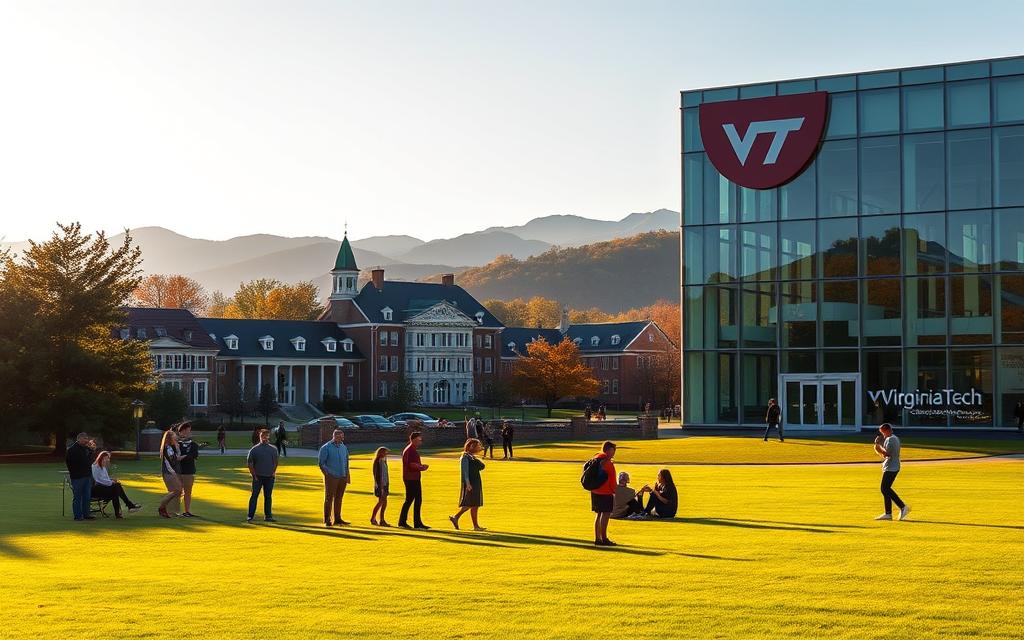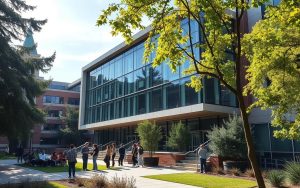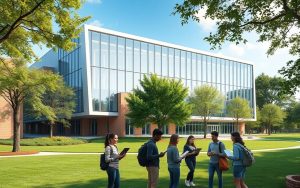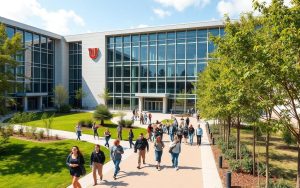Table of Contents
Many aspiring students wonder about the competitiveness of the Virginia Tech CS program. With its strong reputation and growing demand, securing admission requires careful evaluation.
The university ranks #51 nationally, offering an accredited curriculum with excellent faculty. However, acceptance rates and applicant quality make it a selective choice.
Comparing vt computer science admission standards to peer institutions like Purdue or UIUC helps gauge expectations. Strong academic records and extracurriculars boost chances.
This guide explores key factors—program quality, student outcomes, and admission trends—to clarify whether it’s a realistic target for your goals.
Virginia Tech’s Computer Science Program: An Overview
With ABET backing, the university delivers a robust foundation in computational theory and practice. The Computing Accreditation Commission ensures curriculum quality, aligning with industry standards. Graduates gain a competitive edge through this abet accredited computer science program.
Accreditation and Degree Offerings
ABET accreditation signals rigorous training in core areas like algorithms and software development. Three bachelor’s degrees are available:
- Computer Science: Covers broad fundamentals.
- Secure Computing: Focuses on cybersecurity threats.
- Data-Centric Computing: Emphasizes analytics and machine learning.
“ABET accreditation ensures programs meet global benchmarks for technical education.”
Specializations and Tracks
Students customize their path through five advisory tracks. Each blends theory with practical skills:
| Track | Focus Area | Unique Feature |
|---|---|---|
| Human-Computer Interaction | UI/UX Design | Collaborates with psychology departments |
| Media/Creative Computing | Tech + Arts | Digital storytelling labs |
| Systems/Networking | Infrastructure | Cybersecurity Club partnerships |
Cutting-edge labs in Blacksburg support these vt cs specializations. The CS-Squared initiative further bridges classroom learning with real-world projects.
Is Virginia Tech a Reach School for Computer Science Majors?
Selective CS departments often have acceptance rates far below institutional averages. The university’s general admission rate of 56% contrasts sharply with the estimated 25–35% for computing majors. This gap reflects growing demand for tech education nationwide.
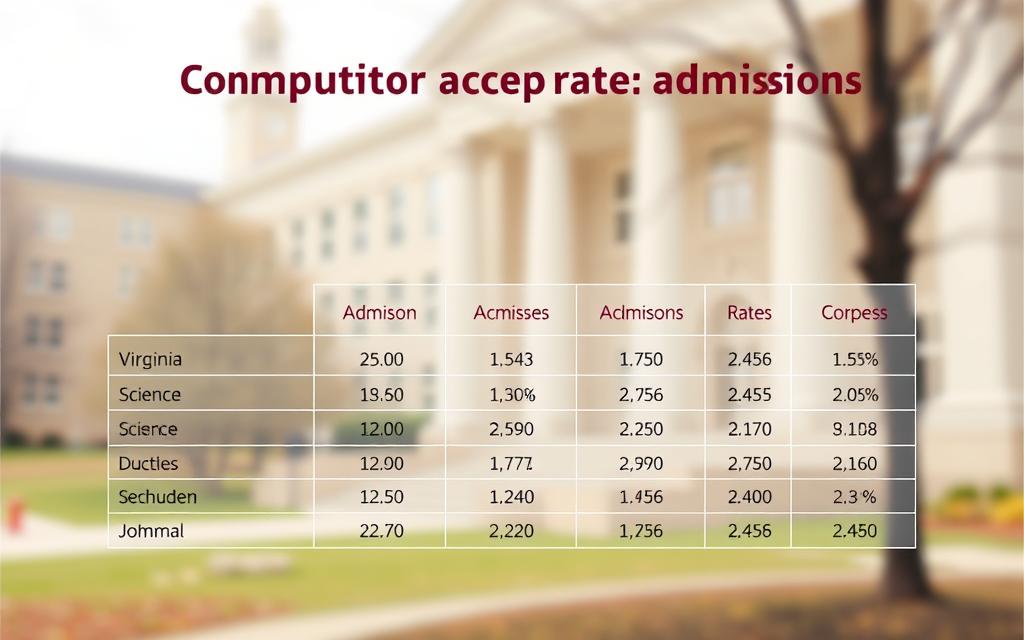
General vs. CS-Specific Acceptance Rates
Over 2,600 applicants competed for limited slots in recent cycles. Enrollment caps and specialized faculty ratios drive higher selectivity. While the broader university admits most qualified candidates, the CS program filters for top-tier academic profiles.
Competitiveness Compared to Peer Programs
Ranked #51 nationally, the department sits between elite and mid-tier options. For context:
- MIT: 4% CS acceptance rate
- Carnegie Mellon: 7%
- Georgia Tech (#5): Sub-20%
Virginia’s public peers like UVA and William & Mary show similar vt computer science competitiveness, making VT a high-target rather than a pure reach.
Key Factors for Admission Success
Standing out in the applicant pool requires more than just strong grades—it demands strategic preparation. Focus on these core areas to boost your chances.
GPA and Course Rigor Expectations
Admitted students typically rank in the top 25% of their class, with an unweighted GPA of 3.8 or higher. Prioritize these courses to demonstrate readiness:
- AP Computer Science: Shows foundational coding skills.
- Multivariable Calculus: Highlights advanced math proficiency.
- Physics: Reinforces problem-solving abilities.
“Summer programs like Governor’s School for STEM can give applicants an edge.”
Extracurriculars That Strengthen Your Application
Beyond academics, committees value hands-on experience. Consider these computer science extracurriculars:
| Activity | Impact |
|---|---|
| Coding Competitions | Demonstrates technical skill under pressure |
| Tech Internships | Shows real-world application |
| Open-Source Projects | Proves initiative and collaboration |
Leadership in STEM clubs or a GitHub portfolio with original projects further sets you apart. Essays should highlight problem-solving wins or mentorship roles.
Program Strengths and Student Opportunities
Beyond academics, Virginia Tech offers unmatched opportunities for CS students to excel. From high-impact research to corporate partnerships, the program bridges classroom learning with real-world impact.
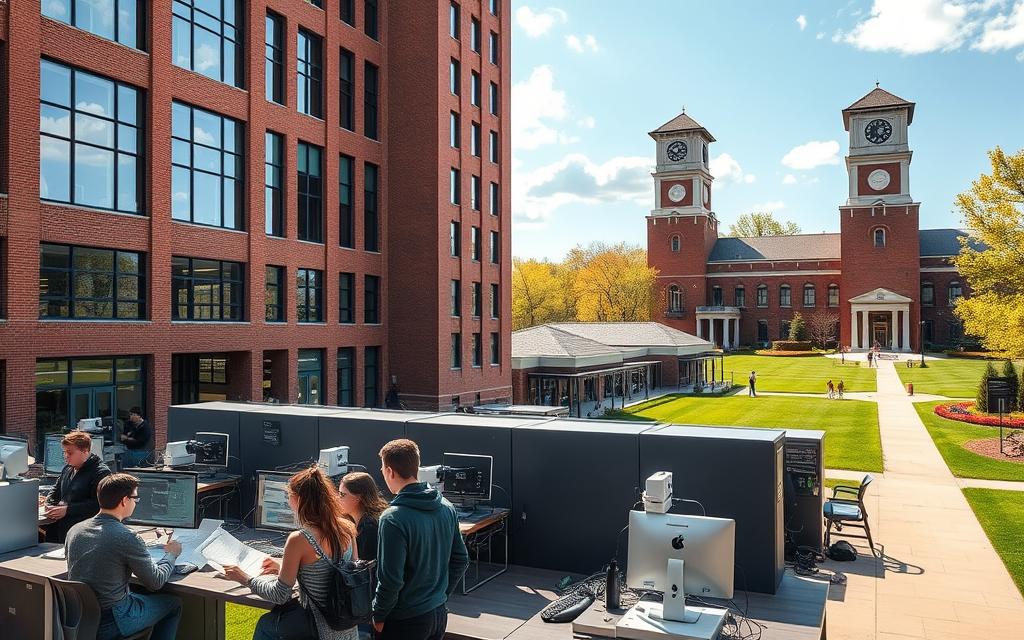
Research and Experiential Learning
Virginia Tech’s research initiatives are fueled by a $75M+ annual budget. Undergraduates contribute to projects in AI, bioinformatics, and cybersecurity through the College of Engineering.
Key experiential programs include:
- Co-op partnerships with Boeing, Northrop Grumman, and DC-area tech firms.
- The Innovation Campus in Northern Virginia, linking students to startups and government agencies.
- Hands-on labs like the Bioinformatics Institute, where students analyze genetic data.
“Our undergrads publish alongside faculty in top-tier journals—rare for a public university.”
Career Outcomes and Alumni Network
Graduates report a median starting salary of $82,000, per VT Career Services. Amazon, Capital One, and defense contractors are top recruiters.
The vt alumni network includes leaders like Craigslist CEO Jim Buckmaster and Boeing’s Dave Calhoun. Silicon Valley and defense sectors heavily hire program graduates.
Notable career resources:
| Resource | Benefit |
|---|---|
| Hokie Mentorship Program | 1:1 guidance from industry veterans |
| VT Engineering Expos | Direct access to 100+ employers |
Conclusion: Is Virginia Tech the Right Choice for Your CS Degree?
Deciding where to pursue computing studies involves balancing multiple factors. The vt cs program review highlights strengths like ABET accreditation, industry ties, and hands-on labs. However, rising competition and larger classes may challenge some learners.
This program excels for students seeking a balanced curriculum with strong corporate connections. Research-focused applicants might explore smaller, specialized schools. Early Decision applicants often gain an edge in selective cycles.
When choosing computer science programs, match your GPA, extracurriculars, and career goals. If industry-ready training and affordability rank high, this option delivers. For those prioritizing startup culture or elite research, weigh alternatives carefully.
Ultimately, is virginia tech good for computer science depends on your priorities. Use admissions data and alumni outcomes to guide your decision.
FAQ
How competitive is Virginia Tech’s Computer Science program?
The program is highly selective, with a lower acceptance rate than the university’s general admissions. Strong academic performance and relevant experience improve chances.
What specializations does Virginia Tech offer for CS majors?
Students can focus on areas like cybersecurity, artificial intelligence, data science, and software engineering through specialized tracks.
Does Virginia Tech’s CS program have ABET accreditation?
Yes, the program is ABET-accredited, ensuring high educational standards and industry recognition.
What GPA do I need for admission into Virginia Tech’s CS program?
Competitive applicants typically have a GPA of 3.8 or higher, along with rigorous coursework in math and science.
How does Virginia Tech’s CS program compare to peer institutions?
It ranks among top public programs, known for strong research, industry partnerships, and career placement rates.
What extracurriculars boost my CS application?
Coding competitions, internships, research projects, and tech-related clubs demonstrate passion and skill.
Are there research opportunities for undergraduates?
Yes, students engage in cutting-edge projects through labs and faculty collaborations.
What career support does Virginia Tech provide CS graduates?
The university offers career fairs, networking events, and alumni connections with top employers like Google and Microsoft.


